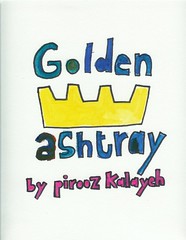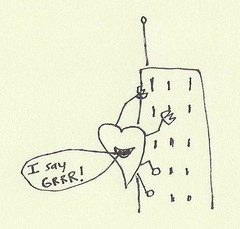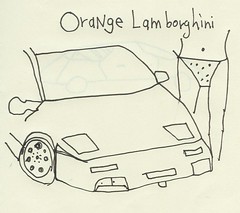I have been looking at the many art forms I have participated in to tally how much more work I need to do to become an expert at my passions. The results are quite interesting.
1. Comic Book Drawing: 2005-2007 (10 hours/wk) = 1,040 hours
2. Painting: 1996-1998 (15 hrs/wk = 1,560 hours); 1998-2001 (312 hours); 2001-2003 (300 hours); 2003-2008 (624 hours) = 2,796 hours
3. Writing: 2001-2003 ( 5 hrs/day = 3,650 hours); 2003-2005 (25 hours/wk = 2,600 hours); 2005-2008 (5 hours/wk = 780 hours) = 7,030 hours
4. Music: 1994-1996 (30 hrs/wk = 3,120 hours); 1996-1999 (1,000 hours); 1999-2001 (15 hours/wk = 1,560 hours); 2001-2003 (150 hours); 2003-2005 (100 hours); 2005-2008 (1,000 hours) = 6,930 hours
5. TV Producing: 2005-2007 (40 hrs/wk = 4, 160 hours) = 4, 160 hours
6. Meditation: 1976-2001 (5 hours); 2001-2003 (10 hours); 2003-2005 (5 hours); 2005-2006(5 hours); 2006-2008 (90 hours) = 115 hours
7. Tennis: 1990-1994 (10 hrs/wk = 2,080 hours); 1994-2007 (300 hours); 2008 (150 hours) = 2,530 hours
8. Teaching: 2000-2001 (Taught gym for a year = 2,184 hours); 2004 (Taught Creative Arts for six months = 1,080 hours); 2003 (Taught Creative Writing for one semester at Naropa = 48 hours); 2005-2007 (Private tutor for about four hours a week = 416 hours); 2007-2008 (Taught ESL at 30 hours/wk = 1,560 hours); 2008-2009 (Taught ESL at Yonsei University = 1,000 hours); 2007-2009 (Taught Composition online at 10 hours/wk = 1,040 hours) = 7, 328 hours
_____________________
Now that I am doing 20 minutes a day of meditation each morning - about 2.5 hours a week - it will take me 90 years to reach mastery (1/3 of an hour x 365 x 90 = 10, 950 hours). I think I need to up the ante to one hour per day, which would make me reach mastery in 30 years (1 hour of meditation x 365 days x 30 = 10, 950 hours).
If I do two hours of writing practice per day, it will take me 4 years to achieve mastery (2 x 365 x 4 = 2,920 hours + 7,030 = 9,950 hours).
If I do one hour of painting practice per day, it will take me 20 years to become an expert.
If I practice music for one hour a day, it will take me ten years to become an expert.
Looking at my next year, I need to raise so much money to be able to live. I would say about $3,500-4,000/month. This will require working about 35-40 hours/week. If I work online, I can have more time to become an expert at different things.
In order to become an expert at writing, I could concentrate solely on that exercise...there are 168 hours in a week - of which I am sleeping about 56 of those hours, which leaves 72 hours to become an expert if I remove sleeping and work...if I remove television watching, scouring the Internet, and leave time for family, let's say two hours a day, that would leave me with 58 hours...if I subtract out eating time, that leaves me with 37 hours...if I keep eating healthy and contribute one hour of exercise each day, that leaves me with 31 hours...if I subtract out the time it takes me to transport my body from place to place, I would be left with 17 hours...If I subtract out an unknown ten hours for unforeseen circumstances, such as a family event, death, or other anomaly, I would be left with 7 hours of actual writing time per week...that makes becoming an expert at writing ten years, if I sacrifice most of my free time.
If I was offered money to write - a grant or scholarship - I could attain my requisite 3,000+ hours within two years by writing five hours a day. This would require a two year writing program, where I wouldn't have to work.
I think this could be my statement of intention for a grant. It is very logical and has good reasoning.
_____________________
Conclusions: Becoming a bum and sitting on someone's couch and practicing an instrument or writing without getting a job might be the only way for people without a lot of money - trust funds and shit - to actually become an expert at what they do. Next time you criticize your friend for not getting a company job that sucks the life out of them, or doing some menial labor that gives them a small paycheck, but lots of free time to contribute to becoming a master at something, take the time to realize that they just might be doing pretty well in three or four years, once they reach that 10,000 hours benchmark.
If you are a parent, and have reached this post by mistake, but have become fascinated with the possibilities of what this means for you or your children, be sure to encourage your child's passions and offer them as much practice time at their passions to insure that they will be a success at what they do.
If you are already a master at one of my passions above, please e-mail me a lesson.
The Desert Rose












13 comments:
Really liked reading this. Writing is a trick. Kerouac talked in words. What was the number? 200,000? 500,000? I think I would talk in years of intense effort. For example, if you lived to be 10,000 years old and spent one hour a year doing something, you would not become an expert in that.
Could be. But does 100,000 words on amphetamines count if a writer cannot remember writing them? ; )
I would say you have an excellent point. Does it have to be consistent? I would say one would definitely roll back the hours a bit if someone stayed away from intense study for long periods of time, but like a tennis player with a rusty backhand, it would only take a couple weeks on the court for it to start ripping again.
One could take the argument further and comment how different art forms may inform one another making it possible for one to become an expert in a much faster fashion than one realizes. For example, I spent four solid years singing day and night. I became an excellent vocalist, but, in the process, I became a songwriter. I didn't know it then, but learning one thing taught me another. I simply had to practice an instrument. Once I could manipulate chords to my voice, I could create songs relying heavily on my voice (the expert) to pull the music into an expert-like location. Over time, as the ability to play an instrument grew, I could rely more on the instrumentation to carry the songwriting process, until there was no real signifying indicator between voice and instrument.
Now with writing there may be a hundred byways and splits upon what one would call study upon prose, poetry, and the multifarious ins and outs that lie between, over, and around them. If one spends three hours on poetry would that be given over to prose? Could we say they effect one another?
I think they do without question. We can also say that playing form one arena to another can help one make certain leaps that may not be possible if an artist stayed within one art form if stagnation had erupted. Play between boundaries can only expand possibilities within art, as is exemplified by the countless experts who have used other art forms to bring more light or angles to their field of expertise i.e. John Lennon, Jerry Garcia, Yoko Ono, Miles Davis, Pablo Picasso, etc.
On a tangent that might taste like a tangerine, I heard a fellow musician say that if a person spent 10,000 hours learning Chopsticks, then they would only be an expert at Chopsticks. Therefore, one could assume that to be an expert - at more than just Chopsticks - would require 10,000 hours of intense study with experimentation, challenges, and continual inventions to push an artist past his or her chopstick limitations. Who knows? Maybe we need to pass out forks and spoons. : )
I heard a tale about Picasso, not sure if it actually happened but its a nice story. He was in a restaurant one day and a lady recognised him and asked if he would draw her a little something, since he was such a brilliant artist. He grabbed a napkin or something handy and did a quick portrait for her then, as he gave it to her, said like "that will be $200". She was shocked "but it only took a few moments for you to draw it". "No it didnt" he replied, "that took me a lifetime to create".
It's great to see someone who plans to put 10,000 hours in order to become an expert in an area (or should I say area's') I'm devoting my life to become an expert in singing and just started to blog about it. Just leaving this comment because I felt that I'm not alone out there to reach that magic 10000 hours.
It took none other than the Buddha seven years to reach enlightenment, an expert on truth perhaps. If he spent 4/hrs a day working at it, meditating or what have you, that would be 10k hours - of intense effort.
Ajan Chah, a Thai Buddhist master, uses the analogy of rubbing two pieces of bamboo together to create a fire. If you don't 'keep at it', the bamboo gets cold again, and you're starting over at the beginning, regardless of how many attempts.
Keep on posting such themes. I like to read blogs like this. Just add some pics :)
CarverDown
Interesting article you got here. It would be great to read more about this theme. Thnx for posting this material.
Joan Stepsen
London Indian escort
I have become an expert at farting. Today I farted for the 500,000 time in my lifetime.
I will celebrate by eating some pork and beans tonight.
I'm also close to "expert status" on taking a dump.
Not sure on how I can profit from this though...
Any suggestions?
That's funny. Take a shit and charge a viewing public. ; )
I think you need to redo your math it will not take you four years of writing to make you a master.
2 X 365 = 730
730 X 4 = 2920 (hours)
But with 13* years under your belt I guess you can successfully call yourself a "master"
Understandably becoming an expert at anything requires a duration and to simply quantify that as a time may overrate or underrate your potential.I think the 10,000 hour mark can be significantly decreased if you train yourself to learn faster. Still what defines an expert? That's up to you I suppose, but I don't think picking your teeth with a toothpick for 10,000 hours is a sufficient talent, I mean you simply don't get any better at that after maybe a month. So first things first: That is to maximize utility. There is this program called brain workshop and if you train on it, you should be able to improve your intelligence or IQ, which is rough estimation of your cognitive abilities. I'll admit it has improved my ability to think, and write a lengthy paragraph such as this; I swear upon it. being great at anything i really about effectively managing time and increasing your reach.
So if you want to become a certain level of something faster, I recommend looking into the brain workshop program I listed above. lol, though I wouldn't spent too much time on it, again it's all about time management.
If you read the book you will see that what is required is not 10,000 hours of doing something; what is required is 10,000 hours of "directed practice". "Directed practice" is distinctly different from the kind of "practice" that most people normally do.
So, 10,000 hours of writing, or 10,000 hours of teaching, or 10,000 hours of playing music do not count as part of the 10,000 hours of "directed practice".
The book details what "directed practice" consists of: suffice to say, playing chopsticks for 10,000 hours or "practicing" in the way that ordinary people "practice" sports or music or academics does not come close. "Directed practice" requires isolating a specific element that needs improvement, concentrating on that element, continually raising the bar on what is considered acceptable, keeping records of your progress and having an objective measure of your improvement. "Directed practice" is such that none of those who did it, found it fun or enjoyed it. The prescription is, therefore, to devote yourself to 10,000 hours of practicing particular individual aspects with which you are not satisfied, despite the fact that all of those hours will be hard work and not enjoyable. The time you spend working at or enjoying your subject (playing music for fun, writing articles, teaching) does not count .
IN addition to the practice, Gladwell also found that all of those who became experts had a specific kind of nurturing environment and encouragement from their families. Whether those things are essential elements in and of themselves of are simply the necessary conditions for a person to be able to withstand the 10,000 hours is not apparent.
Google to find a non-golfer who decided to test the theory by devoting himself to putting in 10,000 hours of practice (to the exclusion of everything else). No doubt putting in 10,000 hours of "directed practice" would result in a very high degree of proficiency; that proficiency is probably necessary but not sufficient to make one recognized as an "expert". There are also the aspects of luck (as recognized by Mick Jagger and others), charisma, publicity, marketing, connections, location and who else the public becomes aware of at the same time. There might be 500 Lady Gagas out there somewhere, but 499 of them are probably out of luck now.
Think about this... If you want to be an expert at sex, you would have to have sex for 1 hour a day for 27 years. hahaha
Post a Comment